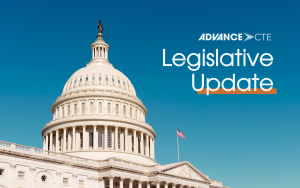 This week, Congress remained on recess as lawmakers look to finalize funding legislation this month. Elsewhere, Advance CTE submitted formal comments on newly proposed rules for distance education while U.S. Secretary of Education Miguel Cardona continued a back-to-school bus tour throughout the nation.
This week, Congress remained on recess as lawmakers look to finalize funding legislation this month. Elsewhere, Advance CTE submitted formal comments on newly proposed rules for distance education while U.S. Secretary of Education Miguel Cardona continued a back-to-school bus tour throughout the nation.
Lawmakers Returning for Busy Work Period
Both chambers of Congress remained on recess this week and are expected to return for a new work period early next week. With only a few weeks until the formal start of the 2025 federal fiscal year (FY25), the need to address federal funding for the coming year is expected to be a key priority on Capitol Hill this month.
House Speaker Mike Johnson (R-LA) is widely expected to introduce legislation that would extend current FY24 funding levels through the early part of 2025—at the start of a new Congress and Presidential Administration. However, the package is likely to contain other controversial provisions opposed by Congressional Democrats and the Biden Administration who favor a shorter-term extension of federal funding through mid-December. This week, the Biden administration also released a set of funding requests for inclusion in any temporary extension of federal funding, known as a continuing resolution (CR), which is likely to be negotiated by Congress this month. Among these funding requests, known as anomalies, the Biden administration is asking Congress for additional funding for the U.S. Department of Education, particularly for the agency’s Federal Student Aid office— the entity responsible for federal student loan servicing as well as the continued rollout of the Free Application for Federal Student Aid (FAFSA) form.
As these efforts and more continue to unfold, Advance CTE will continue to advocate for a strengthened investment in Career Technical Education (CTE) via the Carl D. Perkins Career and Technical Education Act’s (Perkins V) state grant program.
Advance CTE Responds to Distance Education Rulemaking
Late last month, Advance CTE and the Association for Career and Technical Education (ACTE) formally commented on a recent U.S. Department of Education rulemaking regarding the federal definition for distance education and several other issues related to postsecondary education more broadly. The definition of distance education was last updated in 2020 amid the pandemic, and important improvements were made to the concept of remote learning, including allowing for asynchronous instruction. This allowed postsecondary institutions, including area technical centers (ATCs), to continue to innovate while flexibly supporting the needs of learners. ED’s proposed change would considerably narrow this existing definition, largely disallowing asynchronous instruction, which will limit access to opportunities at these institutions for many learners. Advance CTE and ACTE are calling on ED to reverse course and retain these important flexibilities in the federal regulatory definition of distance education moving forward.
Secretary Cardona Begins Back to School Bus Tour
This week, U.S. Secretary of Education Miguel Cardona kicked off his agency’s 2024 “Back to School” bus tour– an effort intended to showcase how schools are leveraging federal education investments and supporting student achievement. The road trip continued this week with stops in Wisconsin, Illinois, Indiana, Michigan, and Pennsylvania to highlight how school communities are using the Biden-Harris administration’s investment in public education to support learners. Events along the route are intended to emphasize the importance of expanding access to local community colleges, highlight the Department’s teacher recruitment and retention programs, and uplift the Department’s role in supporting youth mental health through school communities.

